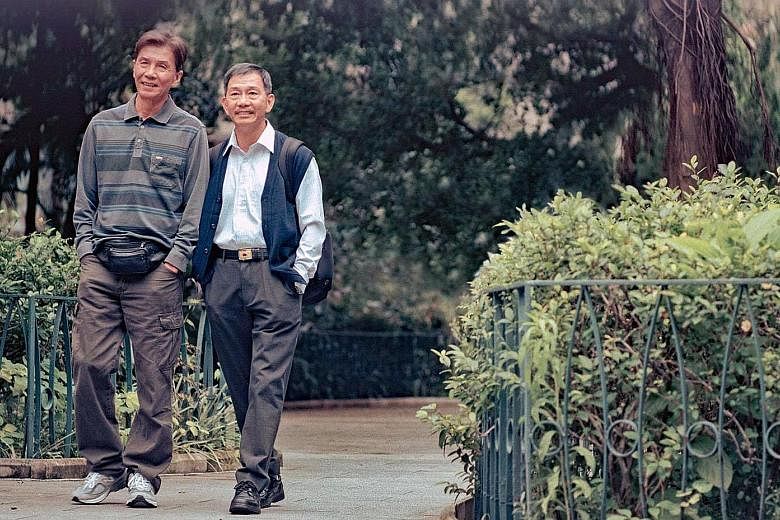In the Hong Kong drama Suk Suk (R21, 92 minutes), two older men are seen having drinks in a cafe, shopping at the wet market and sitting on a park bench.
The "uncles" - the title means uncle in Cantonese - appear to be an ordinary pair of seniors one sees everywhere. They are lovers.
Writer-director Ray Yeung tells The Straits Times in an e-mail interview that he always wanted Suk Suk's central romance to be between two older people - an unpopular artistic choice, given that viewers prefer to see young, attractive persons on screen.
Yeung's film shows Pak (played by Tai Bo) and Hoi (Ben Yuen), two men well into their 60s, doing things lovers do.
Taxi driver Pak lives in fear of his wife and child discovering his double life while Hoi, a divorced man who lives with less anxiety, has to respect Pak's boundaries.
Fudging the visuals to make the film more palatable, as film-makers sometimes do with characters past 50, such as by using flashbacks, was out of the question.
"The aim of the film is to show the experiences of these men in their twilight years. If I had used flashbacks or younger actors to play them, I don't think it would truly reflect their struggles," he says.
The Cantonese-language Suk Suk, Yeung's third feature, will be screened this month as part of the Singapore Chinese Film Festival 2020. It scored five nominations in the 2019 Golden Horse Awards, including Lead Actor (for Yuen and Tai).
At this year's Hong Kong Film Awards, Tai picked up Best Actor while Patra Au, who plays his wife Ching, won Best Supporting Actress. At the same event, the film also earned a Best Picture nomination.
Yeung says that when men of a certain age fall in love, they face problems related to how they had to blend into the mainstream while growing up.
"They were living in an era when homosexuality was illegal and almost everyone had to get married. An unmarried man of a certain age was seen as an outcast and this would affect his status at work, within the family and society at large," says Yeung, whose previous films, Front Cover (2015) and Cut Sleeve Boys (2006), also explored gay themes.
Ching, Pak's wife, is trapped in a loveless marriage.
"These women are married to someone who doesn't desire them. The foundation of their relationship is based on a lie. They suffer, often in silence, wondering why their husbands are not attracted to them sexually. If they find out the truth, it would be devastating," he says.
Compared with a decade ago, it is easier today to get a film such as Suk Suk made, says Yeung, though he did face some difficulties obtaining funding and in casting actors.
Eventually, he found Tai and Yuen - actors with decades of experience in films and television.
With playing gay characters less of a taboo now, Yeung believes that the depiction of such persons on television and in films has improved over time, compared with several years ago, when in films such as Stephen Chow's Kung Fu Hustle (2004), an effeminate character exists purely for laughs.
While it seems that gay characters are popping up everywhere these days, on closer inspection, their tales have little impact on the stories being told.
"In mainstream films, they are usually depicted as side characters who rarely have their own storylines. They are usually there to support the dilemmas of the main leads," he says.
• Suk Suk, with the original Cantonese dialogue (with English subtitles), is being screened as part of the Singapore Chinese Film Festival 2020 from Oct 10. Tickets are selling fast, but more sessions are being added. Details at Filmgarde Cineplexes (str.sg/JBBV)


